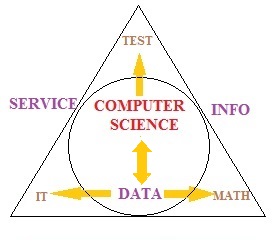Discrete Math
Homework Help & Tutoring
We offer an array of different online Discrete Math tutors, all of whom are advanced in their fields and highly qualified to instruct you.
Discrete Math
Discrete Math - College Homework Help and Online Tutoring
Discrete math, also known as “math for computer science” is usually a required course for students of computer science. The material typically covered in this class for CS students overlaps with fields such as cryptography, logic, information theory, theoretical computer science, artificial intelligence, design of algorithms, and others, and teaches the basic language and structures used by computer scientists.
Sometimes discrete math is listed as a mathematics course. As a math class, it mainly deals with other abstract concepts (algebra, groups, or combinatorics) with a correspondingly heavier focus on proofs. A common characteristic of these classes is that for most students this is their first encounter with mathematical structures and proof. Unlike, for example, calculus classes, there is no commonly accepted definition or syllabus for this course and its content varies by school.
The goal of this topic is to provide important representation models for data sets. This class provides ways for refining the original data model to something more easily understandable in respect of 1) representation format and 2) operations that can be executed on discrete data.
Most discrete math – computer science classes cover the following topics in some order and with varying degrees of depth:
- Basics of logic and mathematical proof (proof by contradiction, proof by induction)
- Set theory and notation
- Representation of integers (bits, bitstring Boolean algebra)
- Basic number theory, computing modules and integer definitions of relations (what is a relational database? A hash table?), and functions
- Basics of graph theory – directed and undirected graphs, useful to understand networking and telecommunications
- Introduction to methods of counting – permutations, combinations etc.
- Combinatorics
- Algorithms – for example sorting algorithms
- Algorithm complexity and estimation of run time – Big O Notation
- Computational Models, finite state machines, pseudocode – basic principles of programming
- Methods of encryption and secure communication – for example RSA algorithms- an introduction to cryptography
For students wishing to learn discrete math topics or looking to supplement understanding and coursework, consider online tutoring through 24HourAnswers! We have many experienced computer science and mathematics tutors available to help. Online tutoring is a great way for students to be guided one-on-one through material at a pace which is comfortable and convenient for the student and which specifically targets the student’s focus on particular topics. 24HourAnswers has a convenient and effective platform for online tutoring right in the browser, where tutors and students can meet to discuss topics in discrete math, using audio, the whiteboard, and a wide variety of tutoring tools.
Discrete math consists of a wide range of topics which our tutors can help with. Work with tutors live to go over proofs in theoretical computer science, applying theorems to prove conclusions. Meet with tutors to delve into topics of logic, reasoning, and inference, building a strong footing underpinning computer science. Tutors can help with any questions in all of the topics from discrete math: set theory, combinatorics, graph theory, number theory, algebraic structures, and more! 24HourAnswers has tutors who are experienced in each of these topics ready to assist students through live tutoring to help students learn these topics and to address any challenges that a student might encounter.
Whether you are an independent learner of discrete math, a college student learning undergraduate discrete math topics as part of a computer science curriculum, or even a graduate student taking advanced discrete math topics at the highest level, we are ready to help. Consider working with our online tutors to build a strong foundation in discrete math by covering core topics within the curriculum, or meet with tutors live to address specific challenging questions and concepts in discrete math. 24HourAnswers is here to help as your resource for discrete math online tutoring!
Discrete Math Homework Help and Tutoring
To fulfill our tutoring mission of online education, our college discrete math homework help and online tutoring centers are standing by 24/7, ready to assist college students who need homework help with all aspects of discrete math - computer science. Our discrete math tutors can help with all your homework and projects, large or small, and we challenge you to find better online discrete math tutoring anywhere.
College Discrete Math Homework Help
Since we have tutors in all Discrete Math related topics, we can provide a range of different services. Our online Discrete Math tutors will:
- Provide specific insight for homework assignments.
- Review broad conceptual ideas and chapters.
- Simplify complex topics into digestible pieces of information.
- Answer any Discrete Math related questions.
- Tailor instruction to fit your style of learning.
With these capabilities, our college Discrete Math tutors will give you the tools you need to gain a comprehensive knowledge of Discrete Math you can use in future courses.
24HourAnswers Online Discrete Math Tutors
Our tutors are just as dedicated to your success in class as you are, so they are available around the clock to assist you with questions, homework, exam preparation and any Discrete Math related assignments you need extra help completing.
In addition to gaining access to highly qualified tutors, you'll also strengthen your confidence level in the classroom when you work with us. This newfound confidence will allow you to apply your Discrete Math knowledge in future courses and keep your education progressing smoothly.
Because our college Discrete Math tutors are fully remote, seeking their help is easy. Rather than spend valuable time trying to find a local Discrete Math tutor you can trust, just call on our tutors whenever you need them without any conflicting schedules getting in the way.






